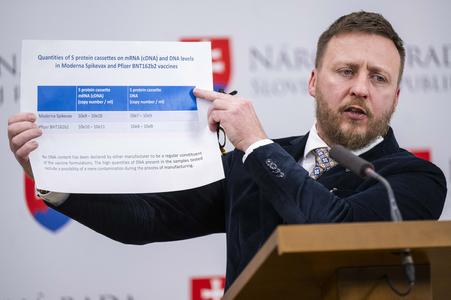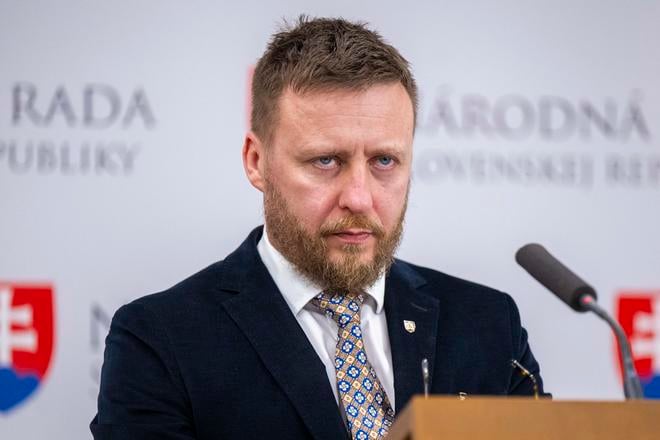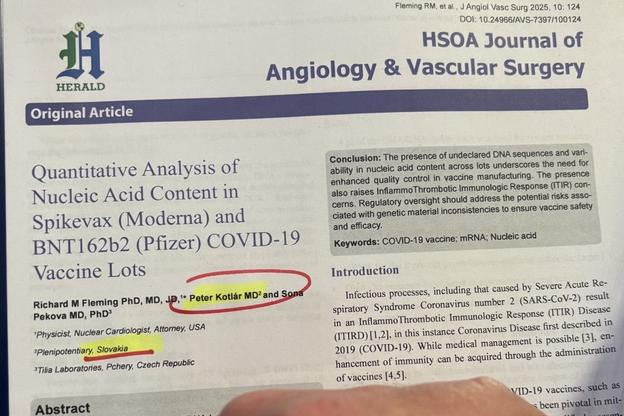Flaunted for months by the government investigator into Slovakia's pandemic response, the mRNA vaccine analysis published last week failed to reveal anything groundbreaking, as many had anticipated. Rather than confirming conspiracy theories about the alleged harmfulness of the vaccines, it actually refuted them. Moreover, the paper did not meet the high standards expected of scientific publishing and appeared in what is known as a predatory journal.
This is a summary of a paper authored by a trio: Richard M. Fleming, a doctor with a questionable reputation; Peter Kotlár, an orthopaedic specialist; and Soňa Peková, a Czech molecular biologist who has publicly expressed belief in extraterrestrial civilisations.

The daily Sme asked experts to comment on the study. They criticised both its execution and the manner of its publication.
This article examines some of the key concerns raised by experts in detail. Other issues are mentioned only briefly or omitted altogether due to their sheer number.
No shortage of self-confidence
Until last Tuesday, only a brief presentation of the analysis results had been made public. Even this presentation displayed serious shortcomings, including potentially incorrect interpretations of the findings. The published study merely confirmed these concerns.
Nonetheless, Peter Kotlár remains entirely confident in the results and their conclusions, which advocate a complete ban on mRNA vaccines.
On Tuesday, Sme highlighted the publication of the paper. Kotlár also sent an email to media outlets containing a photo and accompanying text, urging them to publish it in full.
"Peer-reviewed, published, foreign. There is nothing any scientist can object to. The Slovak Academy of Sciences (SAV), doctors, and scientists – please follow scientific principles and procedures, and refrain from spreading disinformation and misinformation," his brief statement read.
However, it is not only the team behind the study that raises concerns – so too does the journal in which it was published.

A scientific predator
The study was published on the website of Herald Scholarly Open Access, a publisher responsible for dozens of scientific journals. It appeared in the Journal of Angiology & Vascular Surgery.
Although the publisher lists a US address on its website, it actually operates out of India and has previously been labelled as predatory.
Predatory publishers exploit the open access model, whereby authors pay to publish their work. These publishers often solicit manuscripts proactively and claim peer review, as did both Kotlár and the journal, yet frequently fail to uphold legitimate academic standards.
"It's all a worthless scam. These journals send solicitations to authors from reputable journals and deceitfully acquire manuscripts. No reputable scientist would submit anything to them. Peková must have known this, and this speaks to her cognitive decline and the severity of her mental deterioration," says gynaecologist Jozef Záhumenský, commenting on the journal.
Záhumenský also highlighted the journal's impact factor – a measure of how often a journal's articles are cited. The claimed impact factor of 1.7 is not recognised by Clarivate Analytics, which oversees the Web of Science citation index.
"A journal must meet strict criteria to be included in that database. This journal isn't included. Its impact factor is derived from Google Scholar citations, which is merely a search engine," he explained.
Although Kotlár emphasised the paper underwent peer review, the journal's own timeline casts doubt: the manuscript was received on 24 April and accepted on 5 May – a turnaround of just 11 days. Proper peer review usually requires months, including reviewers' comments and subsequent revisions.
"Such a swift process is highly irregular and suggests that the review was not conducted in accordance with established standards," said infectious disease specialist Peter Sabaka.

A poorly written undergraduate paper
The paper's content and analysis also reflect substandard academic rigour.
"It reads as extremely amateurish. A reputable scientific journal would not publish it in this form," said biochemist Peter Holub, citing the glossary that explains basic terms such as DNA and mRNA.
Elsewhere, the text refers to high school-level content, such as the genetic coding of amino acids by RNA triplets.
"It feels as though the paper is intended more for a lay audience than for experts," Holub added.
The references used are sparse. Richard Fleming, listed as the lead author, cites three of his own papers. The study also references two regulatory guidelines (from the EMA and FDA) and three freely accessible DNA sequence databases – none of which are standard scientific citations.
"I've never seen anything like it in a published study,” Holub remarked.
The paper contains numerous anomalies that deviate from scientific norms: Results are displayed via screenshots, complete with icons from the authors' operating systems. The units used (copies per millilitre) are non-standard and not converted to regulatory units.
Batch details (such as production and expiry dates) are missing, though expired batches are mentioned. Image numbering begins at six, an oversight supposedly missed during peer review. The Discussion section includes batch calculations that belong elsewhere.
According to Holub, the comparison of DNA sequences was conducted in a "completely unprofessional way," and the text shows the authors' lack of publication experience.
"Overall, it resembles a very bad undergraduate thesis," he concluded.

Do they even know what they measured?
Kotlár's central claim is that mRNA vaccines contain a high proportion of residual DNA, which he argues could alter human DNA or cause cancer and autoimmune diseases.
Returning to the issue of measurement units: several scientists previously calculated – based on Peková's presentation data – that the detected levels fall well within established safety thresholds.
The new paper does not disprove these calculations. Instead, it introduces further methodological concerns.
Holub notes that the RNA concentrations reported are too low compared to those claimed by vaccine manufacturers. Furthermore, simpler and more reliable methods exist for RNA measurement.
"It's highly unlikely that the manufacturer and official laboratories wouldn't detect such discrepancies. RNA is unstable and degrades easily without proper handling. Since the authors used expired samples, degradation is far more likely," Holub explained.
He added that the technique used by Peková involves multiple steps, each risking RNA loss.
"They almost certainly measured RNA levels incorrectly and wrongly concluded that RNA and DNA levels were comparable – a gross misinterpretation,” Holub said. This also renders their claim that RNA concentration varies significantly between batches meaningless.
Filip Držík, a molecular biologist and oncology expert, noted that the paper often uses speculative or emotionally charged language. For instance, Kotlár’s description of mRNA vaccines as gene therapy is incorrect, as vaccines are preventive, not therapeutic. Moreover, the authors made no effort to verify this claim within their stated objectives.
"Secret" DNA
The authors allege that vaccine manufacturers failed to declare the presence of DNA to regulators. However, such contamination is expected in the production process and was disclosed in documentation submitted during regulatory review.
Držík also raised concerns about the isolation kit used. The authors claimed to isolate both DNA and RNA with a Qiagen kit not validated for RNA extraction.
"According to the manufacturer’s website, the DNA Mini Kit is intended for standard PCR, not real-time PCR. For that, the DNA Micro Kit is recommended," Držík stated. He also questioned other methodological aspects, including the absence of protocols on vaccine sample acquisition and storage conditions.
The paper proves nothing
In their conclusion, the authors call for tighter regulatory oversight. Držík supports that idea in principle, but stresses that the study never claims vaccines cause cancer or alter human DNA.
"Given the speed with which vaccines were developed, the available data show they are of high quality. This paper does not provide a single piece of evidence that they cause serious illness, as Kotlár alleges," he said.
Holub added: "Ironically, the paper essentially reports good news – it acknowledges the effectiveness of mRNA vaccines during the pandemic, confirms DNA levels are well below regulatory thresholds, and shows DNA sequences match manufacturers' claims."
"Sadly, the authors failed to measure RNA concentrations properly, rendering the rest of their findings meaningless."
It is particularly odd that Kotlár, Peková, and Fleming criticise the use of genetic sequences from the original 2020 SARS-CoV-2 strain, while simultaneously analysing outdated vaccine batches. Modern vaccines have already been adapted to current variants.
Who paid for the paper?
In the funding declaration, the authors state that the study was commissioned by Prime Minister Robert Fico through government investigator Peter Kotlár. For a long time, Kotlár refused to clarify who financed the study or whether public funds were used.
Despite the political framing of the study and Kotlár's own advocacy for vaccine re-evaluation since his appointment, the authors deny any conflict of interest.
"Kotlár clearly has a conflict of interest – as a government official, he should not be a co-author," Držík stressed.
Sme reached out to virologist Boris Klempa of the Slovak Academy of Sciences, who was tasked with assessing vaccine contents. He declined to comment due to a potential conflict of interest.
©Sme

 MP and pandemic investigator Peter Kotlár (source: TASR - Jakub Kotian)
MP and pandemic investigator Peter Kotlár (source: TASR - Jakub Kotian)
 The government investigator asked media outlets to publish the picture of the study. (source: Peter Kotlár)
The government investigator asked media outlets to publish the picture of the study. (source: Peter Kotlár)